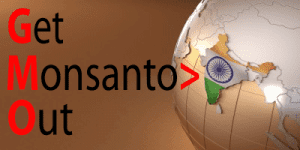By Sayer Ji
Contributing Writer for Wake Up World
A report from the August 17 edition of the American Association for the Advance of Science’s journal Science titled, “Negative Report on GM Crops Shakes Government’s Food Agenda,” revealed that an Indian high-profile parliamentary panel, only a week before, recommended that GM crop “field trials under any garb should be discontinued forthwith,” and that further GM agricultural research should “only be done under strict containment.”[1]
Moreover, in a press conference after the report’s release, the panel’s chair, Basudeb Acharia, said in no uncertain terms: “India should not go in for GM food crops.”
According to the Science article’s author, Pallava Bagla, the panel’s recommendation is being regarded by some “as the death knell of the development of genetically modified food crops in India.” Dissenting interests, such as India’s chief of crop research, Swapan Dutta, a rice geneticist and deputy director at the Indian Council of Agricultural Research, responded to the report by suggesting that if implemented, the panel’s recommendations would paralyze research and threaten India’s food security, and “hope for GM research in India is lost.”
The Indian government has been sending mixed signals about its commitment to agricultural GM technology. For instance, in 2002 the government approved Bt-toxin carrying cotton as the first GM commercial crop in India. Today, there are over 1100 Bt varieties of GM cotton, accounting for 93% of all the cotton sown in India. The prime minister of India himself, Manmohan Singh, voiced his support for GM crops in a recent interview with Science (24 Feb, p. 907), stating: “In due course of time,” he said “we must make use of genetic engineering technologies to increase the productivity of our agriculture.”
But, as the Science article points out, Singh’s own ministers are not towing the party line. For instance, in 2010, former environment minister Jairam Ramesh imposed a moratorium on the commercialization of Bt brinjal, a traditional Indian eggplant, even after the ministry’s scientific advisory panel had given the GM variety approval. Moreover, GM crop researchers in India were already having problems since 2011, because state governments refused to issue certificates that allow GM crop field trials to commence. Also, in the June issue of Science, environmental minister Jayanthi Natarajan was quoted as saying: “genetically modified foods have no place in ensuring India’s food security.”
While the primary justification within Indian government for supporting GM agriculture is based on the fact that it has increased production of economically important products such as cotton, which skyrocketed from .02 million hectares in 2002 to 9.33 million hectares in 2011, the latest panel’s decision was influenced by the fact that all Bt cotton grown commercially in India is derived from technology sold by the multinational food giant Monsanto, who by owning and controlling the seeds has seriously compromised India’s food sovereignty and security.
It has been estimated that 70% of India’s 1.2 billion people are farmers who have no alternative but to buy Bt cotton seed from Monsanto. Also, Monsanto relationship to India farmers is already tenuous considering it was accused of biopiracy earlier this year by India’s National Biodiversity Authority. [2] The panel also stated “there is a connection between Bt cotton and farmer’s suicides,” as thousands of indebted farmers in India’s cotton producing regions have committed suicide in a desperate attempt to rid themselves and their families of debt.
The next step is for government ministries to digest the panel’s report and to decide if the report’s recommendations, which carry political weight but are not mandatory, will be implemented. The Science article concluded:
If the government doesn’t make a forceful case for GM crops, Bhan says, there may be no alternative but to “stop all use of GM crop technology till it has been totally made in India.” And if Monsanto becomes “a nuisance,” he added, “it can be kicked out.” [emphasis added]
Article Sources
- Pallava Bagla. India. Negative report on GM crops shakes government’s food agenda. Science. 2012 Aug 17 ;337(6096):789. PMID: 22903990
- Lucas Laursen . Monsanto to face biopiracy charges in India. Nat Biotechnol. 2012 ;30(1):11. Epub 2012 Jan 9. PMID: 22231080
Recent Articles By Sayer Ji
- The Evidence-Based Healing Properties of 13 Common Fruits
- Dental Composites for Kids: Even Worse Than Mercury Amalgam?
- 13 Evidence-Based Medicinal Properties of Coconut Oil
- Five Amazing Healing Honey Facts
- Is This Fruit Extract 10,000 Times Better Than Chemotherapy?
About the Author
Sayer Ji is the founder and director of GreenMedInfo.com and co-author of the book The Cancer Killers: The Cause Is The Cure with New York Times best-seller Dr. Ben Lerner and Dr. Charles Majors. His writings and research have been published in the Wellbeing Journal, the Journal of Gluten Sensitivity, and have been featured on Mercola.com, NaturalNews.com, Reuters.com, GaryNull.com, and Care2.com. Check out his newest project: Dr. Gourmet.

If you've ever found value in our articles, we'd greatly appreciate your support by purchasing Mindful Meditation Techniques for Kids - A Practical Guide for Adults to Empower Kids with the Gift of Inner Peace and Resilience for Life.
In the spirit of mindfulness, we encourage you to choose the paperback version. Delve into its pages away from screen glare and notifications, allowing yourself to fully immerse in the transformative practices within. The physical book enriches the learning process and serves as a tangible commitment to mindfulness, easily shared among family and friends.
Over the past few years, Wake Up World has faced significant online censorship, impacting our financial ability to stay online. Instead of soliciting donations, we're exploring win-win solutions with our readers to remain financially viable. Moving into book publishing, we hope to secure ongoing funds to continue our mission. With over 8,500 articles published in the past 13 years, we are committed to keeping our content free and accessible to everyone, without resorting to a paywall.








